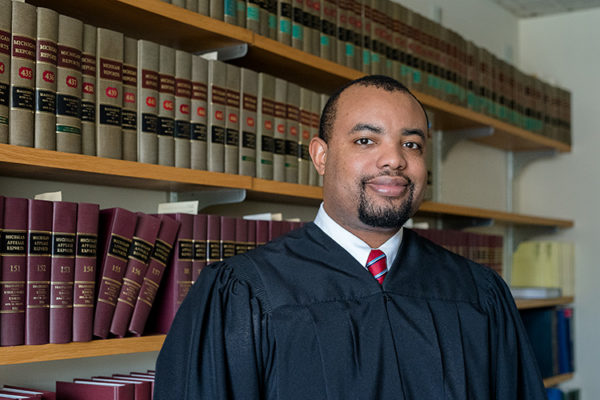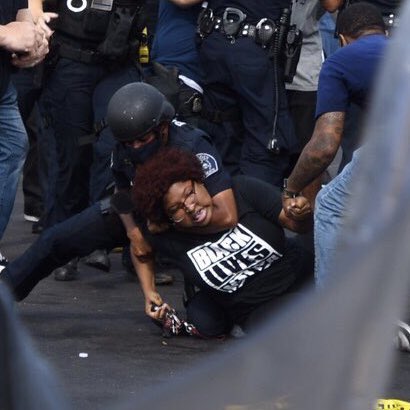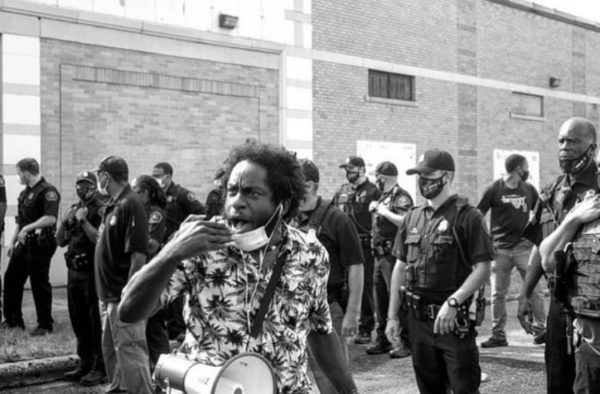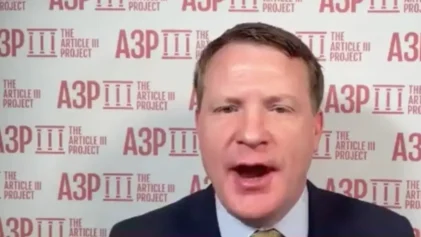A Detroit judge dismissed criminal charges against dozens of Black Lives Matter protesters who were arrested during anti-police brutality marches over the summer.
Citing prosecutors’ lack of evidence and discovery, 36th District Court of Detroit Judge Larry Williams, Jr. tossed out cases filed against 30 protesters during a Jan. 14 hearing.
“Every defendant has the right to due process, and you cannot have a trial by ambush,” said Arnie Chambers, one of the lead defense attorneys in the cases. “So if they’re not going to properly provide the evidence that they’re required to provide to defendants, the proper remedy is dismissal.”

Detroit Will Breathe (DWB) formed as a youth opposition group during unrest that unfolded in the Motor City in the wake of George Floyd’s death. The group organized many of summer protests and members participated in well over 200 marches. DWB proclaimed last week’s dismissals as a stamp of approval.
“The movement in Detroit had demonstrated that we will always do what is necessary to demand justice for Black and Brown lives, regardless of the threat of state retribution,” a celebratory statement on Twitter read. “This ruling is a vindication of the broader struggle for racial justice and liberation.”
As protests roiled in many cities across the nation, Detroit’s midsummer outcry saw hard lines drawn. Tensions escalated between a disgruntled community and the law enforcement agencies commissioned to protect them. Detroit police used tear gas and rubber bullets to clear crowds on a few occasions. Officers rounded up hundreds of protesters, making mass arrests during the first week of uprisings. Many of the large-scale arrests subsided afterward, but random flashpoints of violence flared up during the monthslong power struggle.
During June 28 clashes, a police SUV plowed through a mob of protesters on the city’s Southwest side. Video of the chaotic encounter quickly spread on Facebook. Luckily no one was seriously injured.
In late July, after former President Donald Trump threatened to send federal troops into Detroit. more protests erupted in the city and there was another wave of arrests.
DWB co-founder Tristan Taylor emerged as a leader of the grassroots movement. He was ensnared in a June 2 sweep when Detroit PD made at least 127 arrests for curfew violations. Taylor and other protesters were rounded up on buses and herded to the Little Caesars Sports Arena, home of the Detroit Pistons and Red Wings. There, police used the arena’s spacious concourse to process criminal citations for the group while socially distancing.
On its website, DWB lists 23 demands that range from defunding and demilitarizing the police department to stopping all evictions, holding abusive officers accountable, stopping the use of rubber bullets and a petition to end use of facial recognition software to identify protesters.
Dropping the charges filed against protesters remains one of the group’s key demands.
“I think it says something about the strength of the movement’s position around exposing not only the brutality of police, but also the practice that the police have where they believe themselves to be outside of having to even follow their own rules,” Taylor told Atlanta Black Star on Thursday. “They’re just so used to acting with impunity and getting away with it. And this is an expression of that.”
Taylor is among a group of 14 protesters who filed an Aug. 31 federal lawsuit against the city, Detroit Mayor Michael Duggan, Police Chief James Craig and over 100 police officers. The suit claims police used excessive force to infringe upon protesters’ constitutional right to free speech. It also claims officers instigated violence by deploying “unnecessary, unreasonable and excessive force.” Among the aggressive tactics listed in the lawsuit are police use of batons, riot shields, rubber bullets, chokeholds, and tear gas to quell the protests.

The 14 plaintiffs were also named as defendants in a countersuit the city filed in September. That complaint alleges the protests were part of a “civil conspiracy” to destroy property in Detroit and disrupt peace in the city.
That lawsuit continues to move through the federal court.
Williams, meanwhile, dismissed the cases against protesters without prejudice. That means city of Detroit attorneys have the option to re-file charges if they can bring forth the police officers who made each arrest along with the bodycam evidence from each arrest. So far, city prosecutors haven’t been able to produce either.
“It shows that the counterclaim that the city attorney has filed against us isn’t based on facts that they can prove,” Taylor said of the judge’s ruling. “And it also shows, in a real concrete form, the ways in which the police department routinely acts with impunity.”
National Lawyers Guild in Michigan (NLG) is part of a coalition of legal experts who are representing more than 300 protesters in court pro bono. That collective of attorneys is the dubbed the Detroit Coordinated Defense Coalition.
According to NLG president John Royal, Detroit police arrested busloads of protesters during the summer demonstrations. The protesters were taken to different staging areas where officers had no knowledge of the facts leading to the arrests. It was those officers that signed the criminal citations.
Detroit PD had no way to identify the officers who actually made the arrests and could testify to the protesters’ alleged offenses in court.
Arni Chambers, of the Wayne County Criminal Defense Bar Association, served as lead counsel in the cases Williams dismissed. The Detroit Coordinated Defense Coalition defended 28 of the defendants whose charges Williams dismissed. Two other protesters, who had private attorneys, joined the coalition’s motion for dismissal and had their cases tossed as well.
Chambers said city prosecutors failed to meet Michigan’s discovery requirements for criminal cases. They produced bodycam footage from officers on duty during the protests. But none of the video was relevant to the arrests or clearly showed any of the protesters being taken into custody.
“After months, the city has failed to provide what we would consider any single piece of relevant evidence with regards to any of our clients,” Chambers told Atlanta Black Star. “It’s as if they just randomly picked these officers and their bodycams to turn over to us. Because for whatever reason, we don’t have any bodycams from the officers who arrested our specific clients.”
Both Taylor and Chambers suspect the footage was somehow destroyed.
Most of the arrests were for misdemeanor offenses like disorderly conduct and loitering. Many of the charges stemmed from protests that occurred during the opening days of unrest following George Floyd’s killing, between May 29 and June 2.
Police initially considered filing a felony charge of inciting a riot against Taylor, according to the Detroit Free Press. But Chief Craig opted against that.
Taylor was one of the few protesters that city attorneys did not offer the plea deal — all 14 plaintiffs in the federal lawsuit were snubbed.
The prosecutors extended the settlement offer to the other protesters, giving them the option to settle their cases if they agreed there was probable cause for their arrest. But all the protesters under the Detroit Coordinated Defense Coalition umbrella rejected those offers.
“Our only defense against police brutality is a collective one,” Taylor said. “If we’re to force the powers that be to actually do something to address the issue, it’s going to be on the basis that we have tens of thousands, millions of people out in the streets disrupting society, not allowing business as usual to take place.”

While Judge Williams left the door cracked for city attorneys to reopen the cases, Taylor doubts they can produce enough evidence to do so.
“They can’t figure it out. They don’t know who was doing what at the time,” Taylor said.
A statement from the Detroit Coordinated Defense Coalition indicated a city attorney admitted during hearings Jan. 11 and Jan. 14 that bodycam recordings may have been destroyed. The prosecutor acknowledged she couldn’t name a single officer who could truthfully testify.
“These protesters are not guilty of criminal activity,” said Rubina Mustafa, of the Detroit Justice Center Attorney. “They are merely being targeted for demanding an end to the legacy of violence by police against Black and brown communities.”
Chambers said there are no indications the prosecutors office plans to bring charges back. Now the coalition is turning its attention to convincing 11 other Detroit judges to dismiss cases against protesters.
That seems to be nothing more than a formality at this point. The main concern in those cases is getting the dismissal hearings scheduled on the docket.
“In many of the court rooms, the motions have already been filed. And we’re simply waiting on those judges to make a ruling on that particular day,” Chambers said. “Are they bound by Judge Williams’ ruling? No. But we sure hope that they would follow the precedence that he has laid out, because it’s the right thing to do.”


